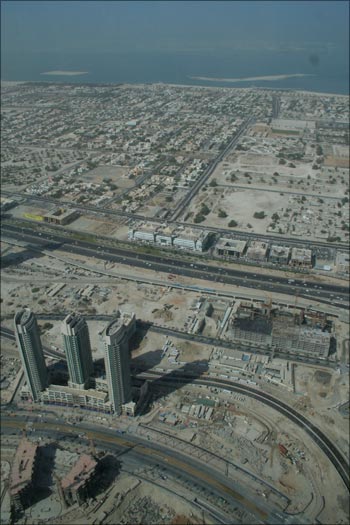
The year 2010 will etch an indelible moment in the rags-to-riches history of a land teeming with superlatives. Towering above the rest of its large, lavish and spectacular brethren, the Burj Tower in Dubai is gearing up to receive the world at its doorsteps.
Developed by Emaar Properties, one of the world's leading real estate companies, the 818-metre tower is expected to be unveiled in January 2010 coinciding with the fourth anniversary of Vice President and Prime Minister Sheikh Mohammed bin Rashid taking over as the ruler of Dubai.
From its gravity-defying height to express elevators to architecture, every aspect of the Burj is a marvel that demands attention.
The centerpiece of Emaar's Dh73 billion ($20 billion) Downtown Dubai project does impress the roving eye instantly.
Rediff.com gives its readers an exclusive peek into the heights of human enterprise.
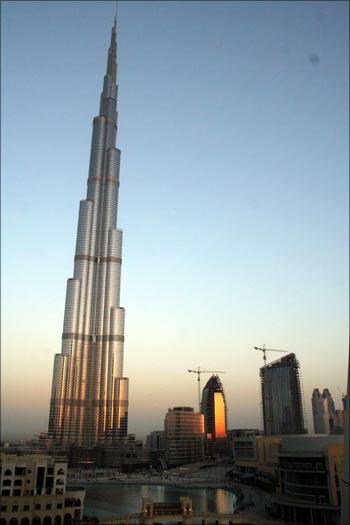
Emaar claims that the 160-floor tower was sold out way back in 2004.
The design inspiration for the Burj is drawn from the desert flower, Hymenocalis, and incorporates patterning systems that are embodied in Islamic architecture.
The tower is designed in the form three petals arranged around a central core. As the tower rises from the flat base, the petals unfold in an upwardly spiralling pattern.
The Burj's structure has employed the latest technologies in wind engineering, structural engineering, structural systems, construction materials and construction methods. It will have a high performance exterior cladding system to withstand the harsh summer temperatures.
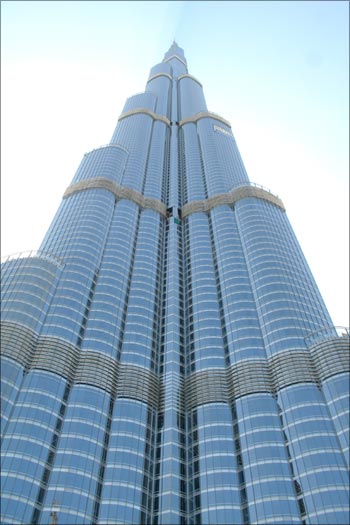
Facts about the Burj
A mixed-use tower, the Burj features 2 million sq ft of residential and over 220,000 sq ft of prime business space, in addition to the Armani Hotel Dubai, and Armani Residences Dubai, luxury hospitality ventures by Emaar in association with haute couture major Giorgio Armani.
The tower offers recreational facilities and entertainment venues, including four luxurious pools and a cigar club, a library, exclusive residents' lounge, serviced residences, fitness facilities and an observatory deck on level 124, 'At The Top', opening to impressive views of Dubai. The tower will also have a large office annexure.
Over 13,000 workers, mostly of Asian origin, toil day and night to keep up the pace of work. It is amazing to note that the tower has come up within a space of five years.
The tower has 57 lifts. Double-deck elevator cabs, catering to the observation deck on level 124, will travel at speeds up to 18 metres a second.
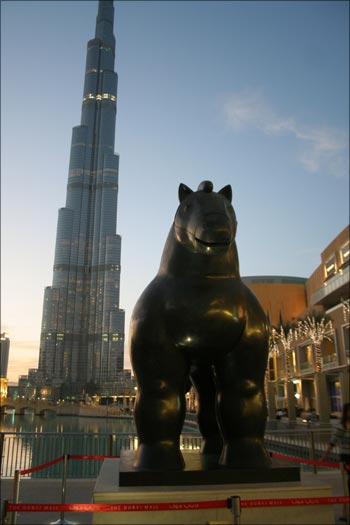
More facts about the Burj
When completed, the tower will have used 330,000 cubic meters of concrete, 39,000 metric tons of steel rebar and 142,000 sq m of glass -- and 22 million man hours.
Transporting the aluminium panels from the fabrication facility to the site (a distance of 16 km) required 2,704 trips, equal to going around the world at the equator.
The panels used to sheathe the tower were fabricated from more than 103,000 sq m of glass, enough to cover 14 standard football pitches.
The tower's architect is Adrian Smith, who worked with Skidmore, Owings and Merrill (SOM) until 2006. The Chicago-based architecture and engineering firm is in-charge of the project.
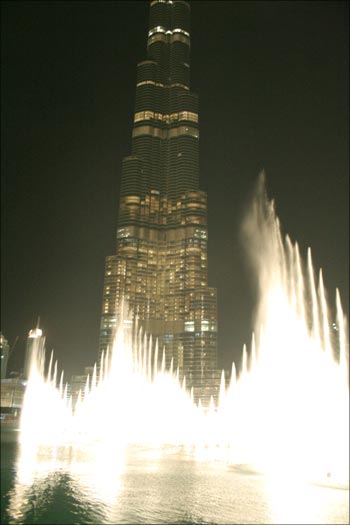
The Burj headlines the Dubai skyline.
To ensure fire safety for the 35,000 people, whom the tower will accommodate once open, a firefighters' lift and secured, air-conditioned evacuation zones have been built every 25 floors.
At more than 2,625 feet, it is taller than the KVLY-TV mast in North Dakota (2,063 ft), till now the world's tallest manmade structure.
At the peak cooling times, the tower will require approximately 10,000 tons of cooling, which is equivalent to the capacity provided by 10,000 tons of melting ice in one day.
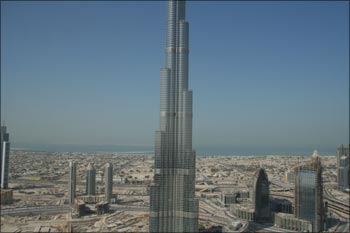
Hot and humid outside air, combined with the cooling requirements of the building, will result in a significant amount of condensation of moisture from the air. This condensed water will be collected and used to irrigate the landscape plantings.
The site irrigation system will provide about 15 million gallons of supplemental water per year, equivalent to nearly 20 Olympics-size swimming pools.
Three huge tower cranes were used to move over 63,300 tonnes of steel reinforcement up to level 156 of the tower and were operational for a total of 45,000 man-hours. A team of 35 skilled technicians manned the cranes and their operators worked at more than 700 metres, almost double the height of the Empire State building.
An estimated 230,000 cubic metres of concrete was used in construction. That is equal to the weight of 100,000 elephants. If laid as a pavement, it would stretch for 1,900 km.
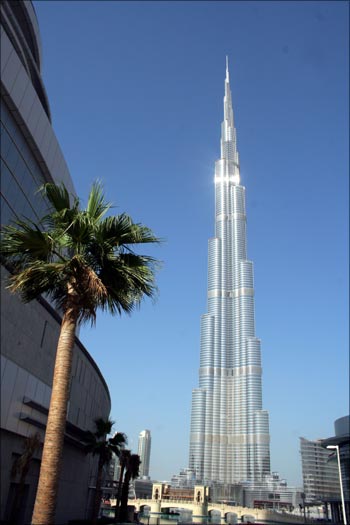
The view from the observation deck on the 124th floor is, quite simply, breathtaking. When the 'At The Top' observation floor opens for public view, one will see the distant landscapes through strategically positioned telescopes.
The work on the floors continues at a fast pace to meet the January 2010 deadline. But doesn't chugging along at mind-boggling heights worry the workers? It does, but it is a risk they are willing to take.
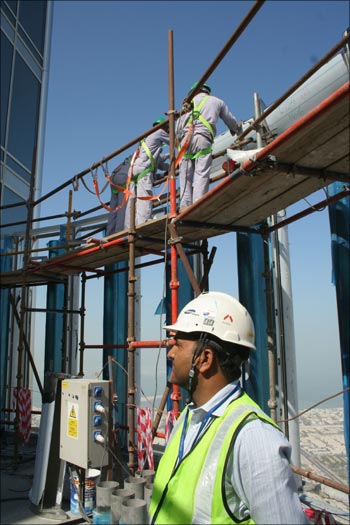
"It will be worth mentioning to my folks back home that I was part of the construction work of the world's tallest building. Despite safety measures like use of harnesses, I do get scared at times. But at the end of the day, I am a satisfied man. . . so are my friends here," says Biju, one of the over 3,000 Indian workers at the site.
"We watch each other's backs on the site. We ensure work carries on unhindered and as directed. There cannot be any sort of slip-ups in a building construction of this magnitude," said a senior worker at the site who did not want to be identified.
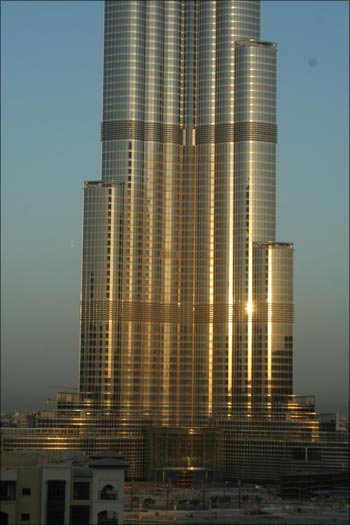
The multi-million dollar luxury apartments in the Burj have already been sold off! But going by the 'To Let' boards plastered across Dubai, owing to the global economic downturn, you still could harbour hopes of making one of the opulent Armani apartments yours.
Media reports have indicated that Dubai's economy has been hit hard due to the global credit crunch and a steep decline in crude prices. The property sector has been hard hit.
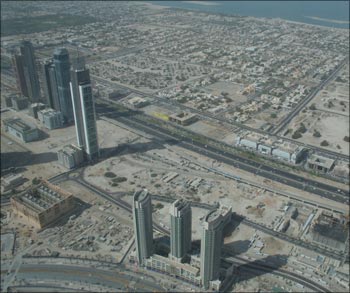
A study issued by Standard and Poor's last month estimated that state-related companies in Dubai are due to repay nearly $50 billion in debt -- 70 per cent of the Gulf emirate's estimated GDP -- within the next three years, the Dawn reported recently.
However, Dubai is pinning its hopes on the largest freefall structure in the world to emerge out of the gloomy times in 2010.